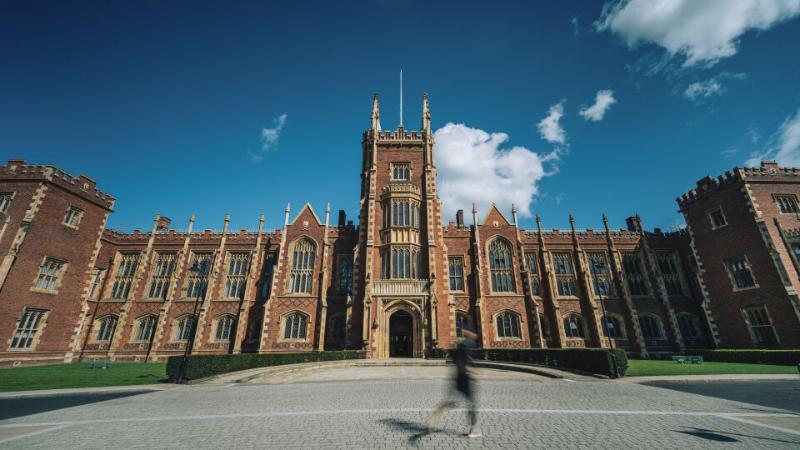Research Workshop: Hubris in International Relations
- Date(s)
- June 16, 2025 - June 20, 2025
- Location
- Queen's University Belfast
- Time
- 09:00 - 17:30
- Price
- Free
Hubris in International Relations
Research Workshop, Queen’s University Belfast. 16th June 2025
Convenors: Alister Miskimmon, Queen’s University Belfast; Ben O’Loughlin, Royal Holloway, University of London; Adam B. Lerner, University of Massachusetts at Lowell
Hubris, in all its guises, is an under-researched phenomenon in International Relations. We define hubris primarily as an over-confidence in one’s own beliefs that leads to overlooking alternative perspectives. Though the term is often used as an epithet against leaders with whom one disagrees, we also acknowledge that hubris is a common quality among the political classes with a unique impact on international affairs. Though typically understood as an individual-level trait, hubris undeniably scales the level of international politics—as the re-election of Donald Trump to the US presidency makes clear. We propose to explore this idea more deeply to investigate how hubris can be better understood as a factor in explaining failure and instability in the international system.
Existing scholarship has analysed hubris only in limited ways. At the level of individual political psychology, studies have analysed how leaders display hubris, often to negative effect. According to Owen and Davidson, hubris is a syndrome acquired over time, and is a ‘…disorder of the possession of power, particularly power which has been associated with overwhelming success, held for a period of years and with minimal constraint on a leader’ (Owen 2008; Owen and Davidson 2009). Owen and Davidson detail 14 symptoms of hubris syndrome impacting political leaders and their actions (Owen and Davidson 2009). While certainly a useful template for analysis of leaders like Trump and Putin, Owen and Davidson’s diagnosis raises questions about how hubris as an individual pathology scales to the level of the state and state action.
Beyond individual-level analysis, studies have noted the prevalence of hubris in narratives in international affairs. Button, for example, has examined the resurgence of the rhetoric of hubris, drawing on Hellenic thought to analyse contemporary politics (Button 2012). He argues that such rhetoric is a threat as it elides ‘…plurality and undermine(s) the conditions necessary for deliberation, good counsel, and shared political judgement’ (Button 2012). Studies have also focused on epistemic hubris—a species of the larger genus—that promotes unwarranted factual certitude or dismissal of inconvenient facts, in pursuit of political aims, to the detriment of collective interests (Barker, Detamble, and Marietta 2022; Pongiglione 2024). Nowhere is this more the case than in the frustrated efforts to forge a collective response to climate change.
Considering its widespread relevance and impacts, we propose to study hubris as a factor that helps explain instability and failure to cooperate. We invite contributors to interrogate this dynamic in relation to a diverse array of cases and subject matter. How do we conceptualise and theorise the role of hubris? How do we identify it and its effects empirically? How do we explain the causes of hubris and its consequences? By what benchmark do we evaluate hubris normatively?
We welcome papers that empirically and theoretically engage with the idea of hubris in IR. We will explore publication of the workshop papers in a leading peer-reviewed journal.
Those interested should submit their paper’s title and abstract (<250 words), as well as a short bio (<50 words) to the three convenors of the workshop (contact details listed below).
Funds are available to cover overnight accommodation for workshop participants.
Convenor Contact details:
Alister Miskimmon, Professor, School of History, Anthropology, Philosophy and Politics, Queen’s University, Belfast. A.Miskimmon@qub.ac.uk
Ben O’Loughlin, Professor of Politics and International Relations, Director of the New Political Communication Unit, Royal Holloway, University of London. Ben.Oloughlin@rhul.ac.uk
Adam B. Lerner, Associate Professor of Political Science, Director of the Bachelor of Liberal Arts, University of Massachusetts at Lowell. adam_lerner@uml.edu
The workshop is jointly organised by the British International Studies Association, Queen’s University Belfast, the University of Massachusetts at Lowell, and Royal Holloway University of London. Funding has been generously provided by the Queen’s University North America Partnership Investment Fund.

- Department
- School of History, Anthropology, Philosophy and Politics
- Audience
- Academics / Researchers
- Add to calendar

